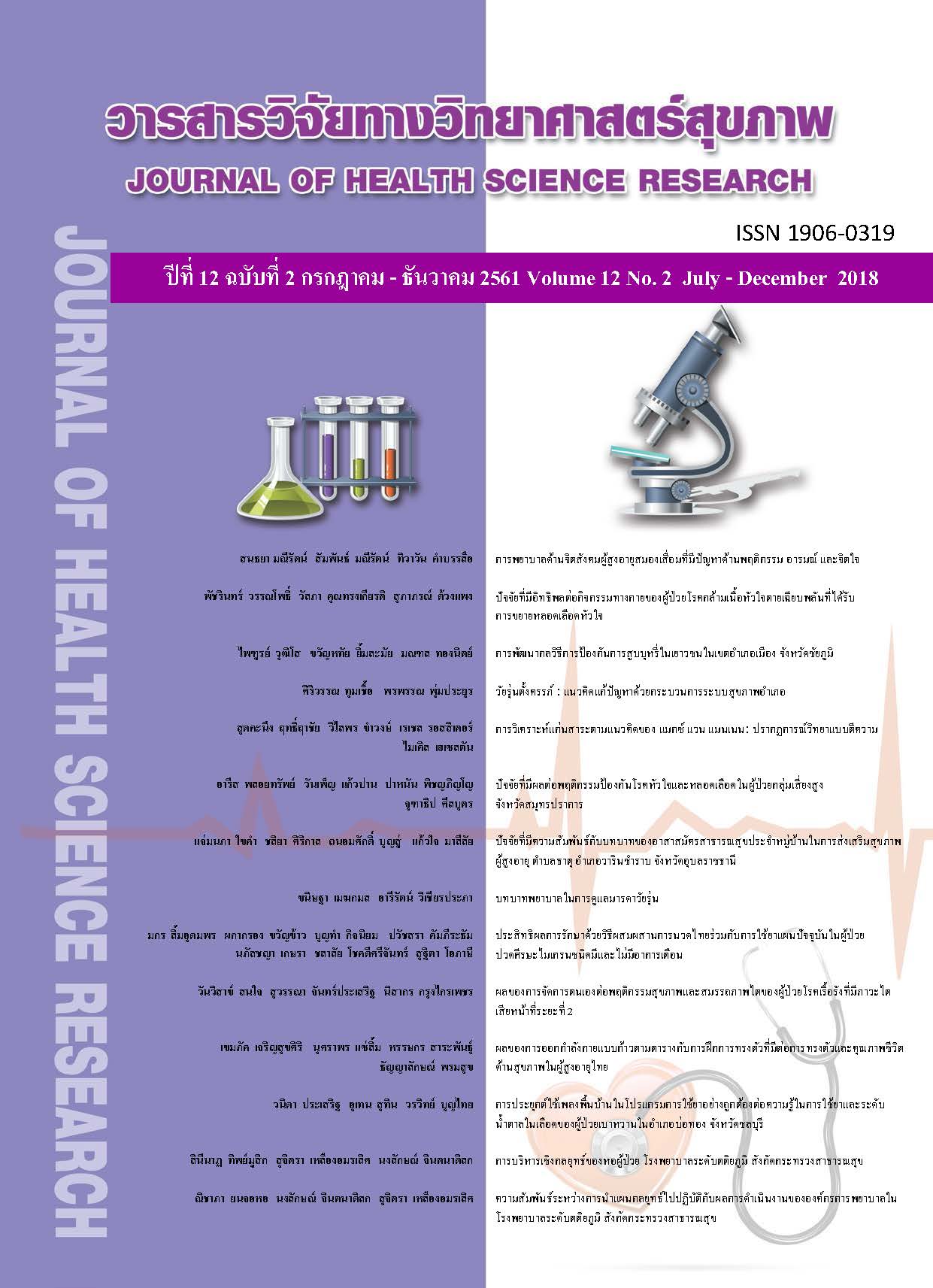การวิเคราะห์แก่นสาระตามแนวคิดของ แมกซ์ แวน แมนเนน: ปรากฏการณ์วิทยาแบบตีความ
Main Article Content
บทคัดย่อ
ปรากฏการณ์วิทยามีวัตถุประสงค์เพื่อแสวงหาความรู้เกี่ยวกับความหมายของการเป็นมนุษย์ในโลก เป็นวิธีการที่พยายามจะอธิบายแก่นแท้ของปรากฏการณ์โดยปราศจากการคาดคะเนล่วงหน้าหรือการตัดสิน ผู้วิจัยเชิงปรากฏการณ์วิทยาแสวงหาข้อมูลด้วยการถามบุคคลว่ามีประสบการณ์ต่อโลกที่อาศัยอยู่อย่างไร แนวคิดปรากฏการณ์วิทยาแบบตีความของแมกซ์ แวน แมนเนนมีความเกี่ยวข้องอย่างยิ่งกับวิจัยทางการพยาบาลเพราะทำให้ได้แนวทางในการเข้าใจประสบการณ์ต่อโลกของบุคคล แนวคิดนี้แบ่งขั้นตอนในการวิเคราะห์ข้อมูลออกเป็น 4 ขั้นตอน ซึ่งช่วยส่งเสริมให้นักวิจัยทางการพยาบาลสร้างถ้อยคำเพื่อที่จะพัฒนาโครงสร้างของความหมายของข้อความหรือประเด็นหลักสำคัญของข้อมูล ประกอบด้วย (1) ถอดข้อมูลจากการสัมภาษณ์โดยละเอียด พร้อมทั้งจดบันทึกข้อมูลโดยเรียบเรียงอย่างเป็นระบบ (2) แยกประเด็นหลักสำคัญของข้อมูล (3) ใช้คำหรือปรับเปลี่ยนภาษาให้สามารถสื่อความหมายถึงประสบการณ์ที่ได้จากการศึกษา และ (4) เขียนบรรยายประเด็นหลักสำคัญเพื่อสะท้อนให้เห็นถึงอารมณ์ ความรู้สึกที่เกิดขึ้นในปรากฏการณ์นั้นๆ ทำให้ผู้วิจัยสามารถเข้าใจความหมายของประสบการณ์ของผู้รับบริการ เหมือนกับผู้วิจัยไปอยู่ในเหตุการณ์หรือเป็นผู้รับบริการเอง ซึ่งจะช่วยทำให้การบริการแก่ผู้รับบริการมีประสิทธิภาพมากยิ่งขึ้น
Downloads
Article Details
บทความที่ได้รับการตีพิมพ์เป็นลิขสิทธิ์ของวิทยาลัยพยาบาลบรมราชชนนี จังหวัดนนทบุรี
ข้อความที่ปรากฏในบทความแต่ละเรื่องในวารสารวิชาการเล่มนี้เป็นความคิดเห็นส่วนตัวของผู้เขียนแต่ละท่านไม่เกี่ยวข้องกับวิทยาลัยพยาบาลบรมราชชนนี จังหวัดนนทบุรี และคณาจารย์ท่านอื่น ในวิทยาลัยฯ แต่อย่างใด ความรับผิดชอบองค์ประกอบทั้งหมดของบทความแต่ละเรื่องเป็นของผู้เขียนแต่ละท่าน หากมีความผิดพลาดใด ๆ ผู้เขียนแต่ละท่านจะรับผิดชอบบทความของตนเองแต่ผู้เดียว
เอกสารอ้างอิง
2.Lopez KA, Willis DG. Descriptive versus interpretive phenomenology: Their contributions to nursing knowledge. Qual Health Res. 2004;14(5):726-35.
3. Munhall PL. Revisioning phenomenology: Nursing and health science research. New York: National League for Nursing; 1994.
4.Swanson-Kauffman KM, Schonwald E. Phenomenology. In: Sarter B, editor. Paths to knowledge: Innovative research methods for nursing. New York: National League for Nursing; 1988. p. 97-105.
5. Carpenter DR. Phenomenology as method. In: Helen J, Speziale S, Carpenter DR, editors. Qualitative research in nursing: Advancing the humanistic imperative. 4th ed. Philadelphia: Lippincott Williams&Wilkins; 2007. p. 75-101.
6. Rose P, Beeby J, Parker D. Academic rigour in the lived experience of researchers using phenomenological methods in nursing. J Adv Nurs. 1995;21(6):1123-29.
7. Stewart D, Mickunas A. Exploring phenomenology: A guide to the field and its literature. 2nd ed. Athens: Ohio University Press; 1990.
8. Laverty SM. Hermeneutic phenomenology and phenomenology: A comparison of historical and methodological considerations. Int J Qual Methods. 2003;2(3):21-35.
9. Koch T. An interpretive research process: Revisiting phenomenological and hermeneutical approaches. Nurse Researcher. 1999;6(3):20-34.
10.Heidegger M. Being and time. Oxford: Blackwell Publishers; 1962.
11.Polkinghorne DE. Methodology for the human sciences: Systems of inquiry. Albany: State University of New York Press; 1983.
12.Ray MA. The richness of phenomenology: Philosophic, theoretical, and methodologic concerns. In: Morse JM, editor. Critical issues in qualitative research methods. Thousand Oaks, CA: Sage Publications; 1994.p. 117-33.
13.van Manen M. Researching lived experience: Human science for an action sensitive pedagogy. State University of New York Press: New York; 1990.
14.Minichiello V, Aroni R, Timewell E, Alexander L. In-depth interviewing: Principles, techniques, analysis. 2nd ed. Melbourne: Longman; 1995.
15.Dowling M. From Husserl to van Manen: A review of different phenomenological approaches. Int J Nurs Stud. 2007;44(1):131-42.
16.Crotty M. The foundations of social research: Meaning and perspective in the research process. Thousand Oaks, CA: Sage Publications; 1998.
17.Boyd CO. Phenomenology: The method. In: Munhall PL, editor. Nursing research: A qualitative perspective. 3rd ed. Sudbury: Jones and Bartlett; 2001. p. 93-122.


